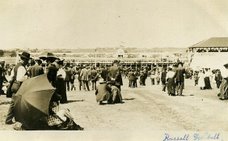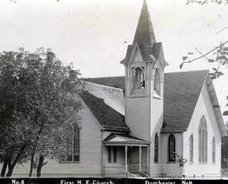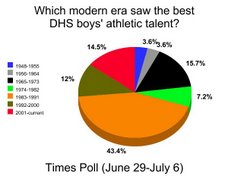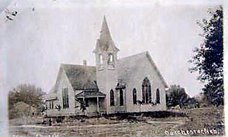 It has been nearly 75 years since World War II came to an end.
It has been nearly 75 years since World War II came to an end.
Today we look back at the post-war economic boom that changed America's economy for the remainder of the century and dramatically altered life in Dorchester and other rural communities.
Dorchester businesses, like most others in the U.S., was booming in the mid-20th century.
During the World War II years and throughout much of the economic surge that followed in the 1950s, Dorchester's businesses community included the following (although not necessarily at any one given time):
- a telephone company;
- three newspapers;
- three beauty salons;
- one bank;
- a drug store;
- three grocery stores;
- one dry goods store;
- two barbers;
- five produce stations;
- four garages;
- three restaurants;
- a bowling alley;
- a carpenter;
- a construction firm
- three farm implements stores;
- an insurance agent;
- a mason;
- a meat market;
- two mortuaries;
- a plumbing and heating repair business;
- five taverns;
- a veterinarian;
- a hardware store;
- one lumber yard;
- the farmers cooperative;
- an investment firm (Guggenmos' Citizens Investment Co., which was housed in the old telephone company building, pictured below as it appeared in the mid-1950s.)
***
 The economic boom that followed WWII impacted every community in the United States, bringing a period of greater prosperity than any time before, even to Dorchester.
The economic boom that followed WWII impacted every community in the United States, bringing a period of greater prosperity than any time before, even to Dorchester.
The 1950s ushered in new industries that supplied Americans with cutting-edge technology, plastics, TVs, frozen foods, automatic home appliances, and improved automobiles.
In 1952, for example, more than 250 dial telephones were installed in Dorchester and the surrounding area. Dorchester's mayor at the time, Miles Pospisil, made the town's first long-distance phone call to K.L. Lawson, general commercial superintendent of the Lincoln Telephone and Telegraph Co. in Lincoln.
***
But the 1950s also brought the end of an era to Dorchester and many other small communities in our area of the country.
Because of improved and more reliable automobiles, Dorchester lost many of its professional service providers during the '50s, including its doctors, dentists and lawyers. In the mid-1950s, search committee was assembled to find a doctor for Dorchester. The bank donated an office with a five-year lease providing free rent. Money was donated by citizens and businesses to remodel the office and many people volunteered their time to help. Dr. Avis Bray was recruited, but she was in town for only a short period after receiving more lucrative offers in larger communities.
By the mid-1960s, Dorchester had experienced a dramatic downsizing of its business community. Even so, it still claimed two grocery stores, the bank, two beauty salons, two garages, three taverns, one mortuary, one produce station, a laundromat, a meat market, a variety store, the lumber yard, a drug store, a ceramic shop, two construction firms, a welder and repair shop, a plumbing and heating repair shop, one restaurant and the Farmers Co-op, of course.
But a new, long-term course had been set.
More area residents were doing commerce in larger nearby communities. More of Dorchester's young people left for college or jobs in the city.
While the post-war years brought more material wealth to Dorchester, they presented new challenges that persisted decades later.
 Kids, are you proud to be an American? Then tell us why!
Kids, are you proud to be an American? Then tell us why!























































